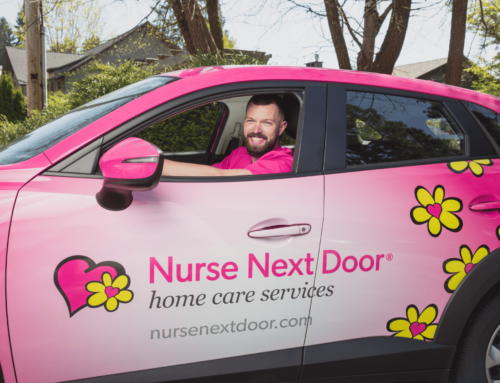Considering a new career path or dreaming of starting an impactful business that improves lives? The home health care market is vast and is expected to grow from $349.02 billion in 2023 to $383.52 billion in 2024. This growth is driven by aging adults who prefer staying in their own homes instead of moving to assisted living facilities or nursing homes. If you’re diving into this sector, understanding the difference between non-medical and medical home care is key. This guide will help you see these differences, guide you on starting your business, and discuss the benefits and challenges along the way.
Our comprehensive Nurse Next Door guide is a must-read for aspiring entrepreneurs, healthcare professionals looking to venture into business, or anyone passionate about bettering home health care. It gives insights into both non-medical and medical home care services, their operations, and their potential to positively impact both your life and the community.

Understanding: What is Home Care?
Home care is all about helping people live independently in their own homes for as long as possible, even when facing health issues. This kind of care ranges from basic help with daily living activities to comprehensive medical services provided by skilled nursing professionals. With an increasing number of people preferring in-home care services, the demand for both non-medical and medical home care is on the rise.
For entrepreneurs looking at this lucrative field, knowing the differences between these services is essential.
The Two Sides of Home Care Services
Home care is divided into two main categories:
- Non-Medical Home Care Services: This service is about assisting with everyday tasks such as meal preparation, personal hygiene, dressing, and light housekeeping. It’s ideal for seniors who wish to remain in their own homes but need a little help. Non-medical home care offers this support with a personal touch, ensuring clients feel cared for and independent.
- Medical Home Care Services: Also known as skilled home care, this involves professional healthcare services like wound care, medication reminders, and monitoring health conditions. These services are delivered by professional caregivers, including licensed nurses, and cater to a wide range of clients, from seniors to those recovering from surgery or managing chronic illnesses.
Understanding these services is crucial for anyone planning to start a home care agency, whether it’s non-medical or medical. It helps define your business model, identify your potential clients, and set the services your agency will offer.
Choosing Your Path: Non-Medical vs. Medical Home Care
Before diving into the home care business, consider a few key factors that can help you decide which types of services are most appropriate to your home care business vision:
🌼 Research Your Market: Get to know the local demand for non-medical and medical home care services. Tailoring your services to meet community needs ensures you make a meaningful impact.
🌼 Know the Regulations: Familiarize yourself with the laws and regulations for both non-medical and medical home care services in your area. This foundational knowledge is vital for running a compliant and successful business.
🌼 Aim for Training Excellence: For medical home care, hiring skilled nursing staff is a must. For non-medical care, quality training programs can boost the level of care, reflecting your commitment to excellence and compassion.
🌼 Build a Network: Establish networks with healthcare facilities, hospitals, and community centers. These partnerships can lead to referrals and expand your impact on community health and well-being.
🌼 Passion and Values: Reflect on what drives you. Choose the path that not only meets your career ambitions but also embodies your values of care and making a difference in the lives of others.
🌼 Financial Considerations: Consider the costs associated with starting a non-medical or medical home care agency. While non-medical care may require less upfront investment, medical care can offer a broader range of services to a wider audience, potentially leading to a more significant impact.
Deciding to start a non-medical or medical home care business should come from a place of passion, informed by a thorough understanding of the market, regulatory landscape, and your financial capabilities. Each option provides a unique opportunity to enhance lives and deliver quality care with heart.
Still navigating the nuances between medical and non-medical home care, or curious about how the costs compare?
Our Franchise Development Manager is here to provide the clarity you need. Don’t hesitate to reach out. Give us a call at 1-855-737-6803 today, and let us help you understand the details that matter most to you.
Starting a Non-Medical Home Care Business: Steps and Benefits
Launching a non-medical home care agency opens the gateway to a significant impact on those preferring to enjoy their senior years in the comfort and familiarity of their own homes. The increasing demand in this sector points to its potential for entrepreneurs dedicated to making a meaningful difference. Here’s how to begin your non-medical home care venture, highlighting the unique advantages it brings.
Key Steps to Launching Your Non-Medical Home Care Agency
Starting your non-medical home care business is an exciting journey that needs careful planning and a deep understanding of your future clients’ needs.
- Conduct Market Research: Investigate the preferences and needs of your target audience, including senior citizens and family members seeking non-medical home care services. Tailor your offerings to meet these demands effectively.
- Understand Regulatory Requirements: Get familiar with the permits and licenses needed to operate a non-medical home care service in your area. Consulting with legal experts can help ensure you meet all regulatory requirements.
- Develop a Business Plan: Craft a detailed business plan that outlines your vision, services, marketing efforts, and financial projections. A solid plan guides your business and attracts potential investors.
- Marketing Your Services: Create a strong online presence and connect with your local community. A professional website, active social media engagement, and local networking can spotlight your in-home care services.
Advantages of a Non-Medical Home Care Business
Starting a non-medical home care business offers both financial advantages and the chance for deep personal and community fulfillment.
- Low Startup Costs: Compared to medical home care agencies, non-medical home care businesses often require lower initial investments, making it more accessible for many entrepreneurs.
- Growing Demand: The desire among seniors and family members for non-medical services like personal care, meal preparation, and light housekeeping is increasing, presenting ample opportunities for business expansion.
- Personal Fulfillment: There’s immense satisfaction in enabling individuals to maintain their independence and dignity in their own homes, significantly impacting both personal lives and community welfare.
In essence, launching a non-medical home care business blends opportunity with heartfelt service, empowering entrepreneurs to prosper while positively affecting the lives they serve.
Establishing a Medical Home Care Business: Steps and Benefits
Starting a medical home care business allows you to offer specialized health services directly in the clients’ homes. This venture meets a critical healthcare need and aligns with the increasing preference for personalized, in-home health care solutions. Here are the steps to begin your medical home care agency and the benefits.
Essential Steps for Starting a Medical Home Care Agency
Creating a medical home care business is a commitment to improving healthcare delivery at home. These steps are crucial for setting up a reputable service:
- Secure Accreditation: Gaining accreditation demonstrates your commitment to the highest patient care and operational standards, reflecting our core values.
- Recruit Compassionate Professionals: Assemble a team of qualified medical professionals, including nurses and therapists, who are dedicated to making a difference in clients’ lives, emphasizing the importance of medical care and professional caregivers.
- Insurance and Regulatory Compliance: Making sure your services are covered by Medicare, Medicaid, and private insurance enhances accessibility. Complying with healthcare regulations protects both your clients and your business.
- Navigate Healthcare Regulations: Being well-informed about and compliant with healthcare laws ensures the safety and well-being of your clients and the integrity of your agency.
Starting a medical home care business means more than launching a venture; it’s a pledge to enrich lives with skilled and compassionate care, embodying the ethos of making lives better.
Benefits of Operating a Medical Home Care Business
Running a medical home care business is filled with opportunities to significantly impact your community by offering a range of medical services.
- Comprehensive Care Offerings: Providing a wide array of services, from skilled nursing to wound care and medication management, meets varied client needs, enhancing satisfaction and enabling higher service fees.
- Expanded Client Base: Catering to clients with complex health conditions, including those needing chronic illness management or post-surgery care, broadens your impact and client base.
- Meaningful Impact: The heart of a medical home care business is the profound change you bring to clients’ lives, offering both deep personal fulfillment and a strong business model aligned with our dedication to making a difference.
Starting a home care business, whether non-medical or medical, isn’t just about tapping into a growing market—it’s a venture into making a real difference in people’s lives, with each path providing unique opportunities for success and impactful service.
Navigating the Financials: Costs Associated with Starting a Home Care Businesses
Getting the financials sorted is essential when diving into the home care business. For entrepreneurs leaning towards a non-medical home care agency, the initial costs are often more manageable, covering essentials like licensing, marketing, and staffing—a perfect start for own home care business enthusiasts. On the flip side, launching a medical home care business demands a higher initial investment due to the need for specialized staff, nursing supplies, and compliance with stringent medical assistance regulations.
Both paths incur ongoing expenses such as payroll, insurance, and marketing efforts. Yet, the higher quality services provided by medical home care agencies might lead to higher revenue opportunities. Effective financial management is crucial for guiding your venture toward long-term profitability and providing medical care for the long term.
- Consider Starting Non-Medical: Initiating your venture with non-medical services offers a cost-effective entry point with the potential to scale into medical services as you gain insights and resources.
- Budget Wisely: Monitoring your budget with financial tools or software is key to keeping expenses and income aligned, especially when it comes to running client errands or preparing meals for clients.
- Seek Financial Advice: A financial advisor with healthcare experience can offer valuable strategies for efficient business management and expansion.
Wrapping Up: Your Journey Toward Impactful Home Care Entrepreneurship
Entering the home care industry, whether through a non-medical or medical route, presents a unique opportunity to tap into a growing market and profoundly impact your community. We’ve explored key steps, advantages, and financial insights to equip you with the knowledge needed for an informed start.
- Research Thoroughly: Dive deep into local market needs and regulatory requirements to tailor your services, whether it’s personal care, meal preparation, or respite care.
- Plan for Growth: Look ahead to expanding your offerings or client base, possibly incorporating long-term assistance or home healthcare services for aging loved ones.
- Embrace the Challenge: Launching a business is tough, but the chance to support families, seniors, and recently discharged patients offers unparalleled satisfaction.
Partnering with Nurse Next Door: A Fast-Track for Home Care Entrepreneurs
Choosing between starting from scratch or franchising is your next big step after deciding on a non-medical or medical home care business. Franchising with Nurse Next Door could be your ticket to success.
Nurse Next Door Supports You With:
🌼 Empowered Caregiver Recruitment: We streamline hiring with our focus on attracting non-medical caregivers and medical professionals who are passionate about making a difference.
🌼 Marketing & Brand Mastery: Boost your visibility and impact with our standout marketing strategies and recognizable Bold Pink brand, ensuring your services, like doctor appointment assistance or light housekeeping, reach those in need.
🌼 Client Connection and Retention: Our central system and call center supports you in connecting seamlessly with family caregivers and senior loved ones, fostering strong relationships through our Happier Aging™ philosophy.
🌼 Ongoing Training and Mentorship: You will benefit from continuous learning and direct mentorship, ensuring your home care aides and professional caregivers excel.
🌼 Navigational Licensing and Regulation Support: We guide you through the licensing maze and help you stay compliant, a crucial step for both home health care services and personal care services.
🌼 Business and Financial Planning Assistance: Our expert advice helps you craft a solid plan for growth, from daily living assistance to skilled care.
Your Next Steps Toward Your Home Care Ownership
Are you ready to take the leap into owning your own home care business? Here’s what you need to do next:
- Choose Your Path: Build your own agency or join the Nurse Next Door community through franchising.
- Craft Your Business Blueprint: Create a business plan outlining your plans for a non-medical or medical home care service, focusing on home care agency owners’ needs and market demands.
- Dive into Franchise Discovery: Delve into the specifics of our home care franchise model and consult with a Franchise Development Manager to begin exploring whether home care through Happier Aging™ is the right choice for you.
Join Nurse Next Door, a network spanning the United States, Canada, England, and Australia, and benefit from the support of a business coach. Our comprehensive support system allows you to concentrate on what matters most—providing premium care and expanding your business with impact.

 x
x








